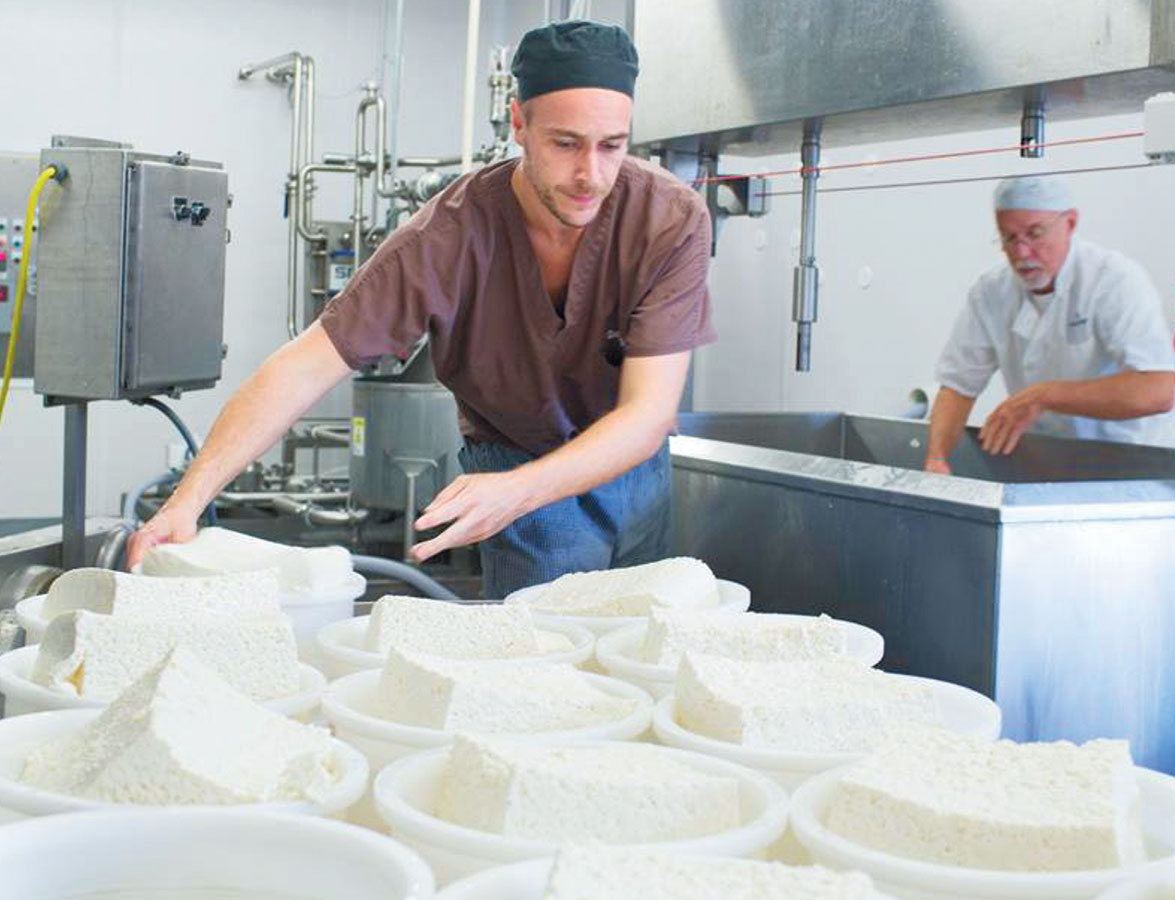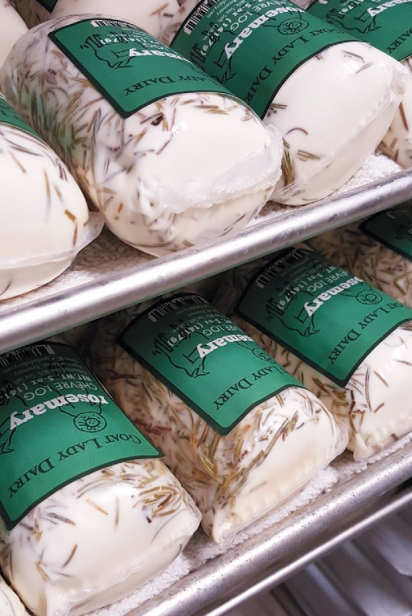Alexander Kast/Goat Lady Diary
Aroma can be a powerful sensation that pulls us across time and place to relive key moments in our past: the warm embrace of grandma’s perfume, the exotic fragrance of a honeymoon meal on foreign soil, the comforting smell of casseroles brought to a bereavement dinner.
The aroma that stirs Alexander Kast, however, is not among those most people would cite as inspirational. The unmistakable stink of damp mold takes Kast back to happy adolescent summers in England, where his elder sister and her husband make cheese for the renowned Neal’s Yard Dairy.
At age 12, the now 31-year-old Kast couldn’t have imagined that his first taste of mature cheeses—so intense that their smell permeated the walls of the couple’s apartment above the famed Borough Market shop in London—would provide such a formative experience. Yet it was the start of a journey that led him in 2012 to Goat Lady Dairy in Climax. As a lead cheese maker and head of sales, he’s helped to streamline the 20-year-old business’ production processes and expand its line of award-winning goat and cow milk cheeses.
“Some people might find that smell unpleasant but it’s a very inviting smell to me,” says Kast, a Detroit native who lives in Pittsboro with his wife, Cheryl-Anne, owner of Kast Events, and their 2-year-old daughter, Amelia. “It makes me feel cozy and at home.”
Kast believes the richly organic odors “sowed an unconscious seed” in his mind long before he ever made cheese himself or even thought about selling any. Lazy summer vacations gave way to high school and college in Montana, where his family had relocated. But when it came time to look for a job, Kast set aside his journalism training to take an entry level position at Saxelby Cheesemongers, a leading purveyor of American artisan cheeses located in Manhattan’s Lower East Side.
“That’s where I got my first mongering gig, and you couldn’t ask for a better start,” says Kast, who soon landed another part-time position at Brooklyn’s Bedford Cheese Shop, which carried a deep selection of European brands. “Because New York has that density and customer base, you can get stuff there that you can get nowhere else. It’s the first place it stops when it comes to U.S., so it’s as good as it gets.”
After three years in the city, Kast summoned the courage to apply for a training position at Neal’s Yard Dairy. The intensive opportunity brought him back to London and the aromatic apartment where it all started. This time, though, his family also was his boss.
Under his sister and brother-in-law’s guidance, Kast trained in every facet of the operation. “Neal’s Yard is renowned for its care of cheese and basically being sticklers for perfection,” he says. “I learned more there in a short period of time than I could anywhere else.”
The youngest of nine siblings, Kast comes from a long line of artisan food producers. His German parents had emigrated to the U.S. in 1959, escaping the ravages of post-war life and leaving extended family behind. Several generations on his father’s side were Bavarian butchers in Schweinfurt, essentially “pig town.” This food legacy followed his father to Detroit where, as the owner of a successful data processing company, he became an investor in several restaurants and a then-fledgling artisanal jam company, American Spoon.
“I always felt a connection to fine food and dining,” says Kast, whose brother, Maximillan, was likewise inspired. The elder Kast brother has served as the Fearrington House sommelier and wine director since 2007.
With his brother established in North Carolina, Kast accepted encouragement to come here in 2008 and work at Fearrington. He waited tables in classic European style, happy to work with his brother but aching to get back into cheese. When he heard about an opportunity to manage the sprawling cheese department at Southern Season, he jumped.
Kast joined the Chapel Hill-based company in 2010, growing the position to also include management of the bakery and deli. In addition to the fine imported cheese that discerning customers came to expect, he added items from farmstead producers across North Carolina and several other states and presented weekly in-store seminars.
The opportunity brought Kast to the attention of the American Cheese Society (ACS), which held its 2012 national conference in Raleigh. Kast received a grant to attend and was recruited to serve on the society’s board as its local contact on the event planning committee. “The experience helped me develop a lot of really strong relationships with a lot of people,” he says gratefully.
Among them was another local cheese maker who served on the ACS board: Steve Tate, owner of Goat Lady Dairy.
“We clicked right away. I invited Steve to do a class with me at Southern Season on cheese making. At some point he told me, ‘I’m going to steal you away from this place,’” Kast recalls with a laugh.
And he did. Kast transitioned to Goat Lady in January 2012, when its significantly overhauled and expanded production facilities went online. The larger space, including temperature- and humidity-controlled aging rooms, allowed the Randolph County producer to introduce new cheeses that have enhanced its national profile as a leading producer of goat and cow milk cheeses.
In fact, two labels developed by Tate and fine-tuned by Kast— Lindale, a cow milk Gouda, and Providence, an aged goat milk cheese—are finalists in the national 2016 Good Food Awards. Tate and Kast learned about Goat Lady’s selection in November and hope to travel to California to accept awards in January.
And that, clearly, would be the unmistakably sweet smell of success. The achievement would be good not just for Goat Lady Dairy, Kast is quick to point out, but for all North Carolina cheese makers.
“I hope it will help to bring more love to the local cheese scene,” he says. “We have more dairy producers than any other state in the South, but we’re so focused on barbecue and fish and beer. That’s all great, but there is something fantastic here that doesn’t get much play.
“We want people to know that cheese is an art form. It’s really quite beautiful,” Kast says earnestly. “North Carolina dairies also are all in a good relationship with one another, which I think is pretty unique. We realize that the more cheese all of us sell, and the better the products we all put out in the market, makes us a stronger commodity together.”
GOAT LADY’S 20TH ANNIVERSARY AND PLANNED SALE
Steve Tate knew what he was doing when he recruited Alexander Kast to join Goat Lady Dairy in 2012.
The business, established by his late sister, “goat lady” namesake Ginnie Tate, was three years from marking its 20th anniversary. Supported by a $300,000 USDA grant, its facilities were expanded and upgraded, turning a dirt-floor barn into a pristine, high-tech, and emphatically sustainable production, aging and packaging center.
And Tate, who took over Goat Lady with his wife, Lee, as a second career after closing a counseling practice and moving here from Minnesota, was thinking about retirement. He wanted to ensure that the business was stable and successful, and that he had the right team of employees in place, so he could sell Goat Lady Dairy to someone willing to commit to its high standards.
“It only took two encounters with Alexander in the summer of 2012 for me to know he was special,” says Tate, who will make keeping Kast and longtime cheese production manager Carrie Bradds in place as a condition of sale. “I knew we were expanding and needed talent like his to help us grow.”
Tate credits Kast with a dynamic combination of intelligence, creativity and enthusiasm, as well as an irreproachable work ethic. “He’s a natural-born cheese maker. Everyone likes him and he has developed a far flung network of friends and contacts,” says Tate, who hired Kast’s wife, Cheryl-Anne of Kast Events, to present Goat Lady Dairy’s 20th anniversary celebration in October. Kast Events was also recently chosen to organize the 2016 Farm to Fork event, an initiative of the Center for Environmental Farming Systems that celebrates local food and farmers.





